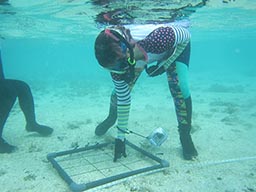- ABOUT US
- PROGRAM AREAS
- CONSERVATION APPROACH
- EDUCATION
- MULTIMEDIA
A Decade of Coral Restoration and Sustainable Development

The United Nations has entered an exciting decade of focusing on marine and other important ecosystems, and the services they provide. The UN has declared 2021 to 2030 both the Decade on Ecosystem Restoration and the Decade on Ocean Science for Sustainable Development. The UN Decade on Ecosystem Restoration aims to massively scale up the restoration of degraded and destroyed ecosystems as a proven measure to fight climate change and enhance food security, water supply and biodiversity. The Decade on Ocean Science for Sustainable Development will provide a common framework to ensure that ocean science can fully support countries’ actions to sustainably manage the oceans and more particularly to achieve the 2030 Agenda for Sustainable Development. The NOAA Coral Reef Conservation Program views coral reefs restoration as a critical activity in addressing both of these topics.
Coral reef restoration has historically been a reactive activity following specific events like vessel groundings and storm damage. However, the coral community now recognizes that the climate and marine environments are changing quicker than coral reef ecosystems can recover by themselves. Coral reef restoration is now used as a support tool that provides coral reefs with the time necessary to heal, recuperate, and thrive.
Coral reef ecosystems support a quarter of all marine species, including many commercially important fisheries species. They provide billions of dollars annually for the United States alone in recreation and tourism, recreational and commercial fishing, and coastal protection. In fact, a U.S. Geological Survey study determined that U.S. coral reefs protect over 18,000 Americans, more than $825 million in coastal infrastructure, and nearly $700 million in economic activity from flooding every year. Restoring coral reefs, and scaling up restoration through projects like Missions: Iconic Reefs and 100 Yards of Hope will allow communities to boost food security and local biodiversity, maintain tourism industries, and improve protection from flooding and storms.
As the world focuses the next decade on ecosystem restoration and ocean science for sustainable development, NOAA will continue to fund, research, and conduct the latest coral restoration techniques to maintain viable coral reef ecosystems.
Related Stories and Products
About Us

The NOAA Coral Reef Conservation Program was established in 2000 by the Coral Reef Conservation Act. Headquartered in Silver Spring, Maryland, the program is part of NOAA's Office for Coastal Management.

The Coral Reef Information System (CoRIS) is the program's information portal that provides access to NOAA coral reef data and products.
Work With US
U.S. Coral Reef Task Force
Funding Opportunities
Employment
Fellowship Program
Contracting Assistance
Graphic Identifier
Featured Stories Archive

Access the archive of featured stories here...
Feedback
Thank you for visiting NOAA’s Coral Reef Conservation Program online. Please take our website satisfaction survey. We welcome your ideas, comments, and feedback. Questions? Email coralreef@noaa.gov.
Stay Connected
Contact Us
NOAA’s Coral Reef Conservation Program
SSMC4, 10th Floor
1305 East West Highway
Silver Spring, MD 20910
coralreef@noaa.gov
